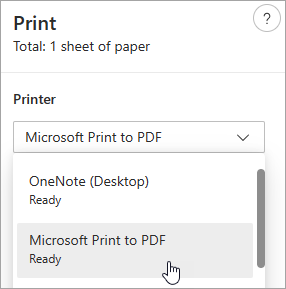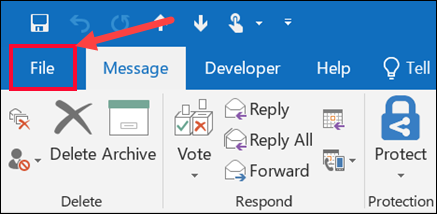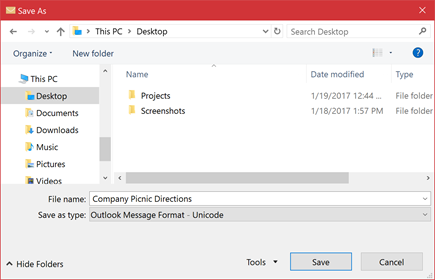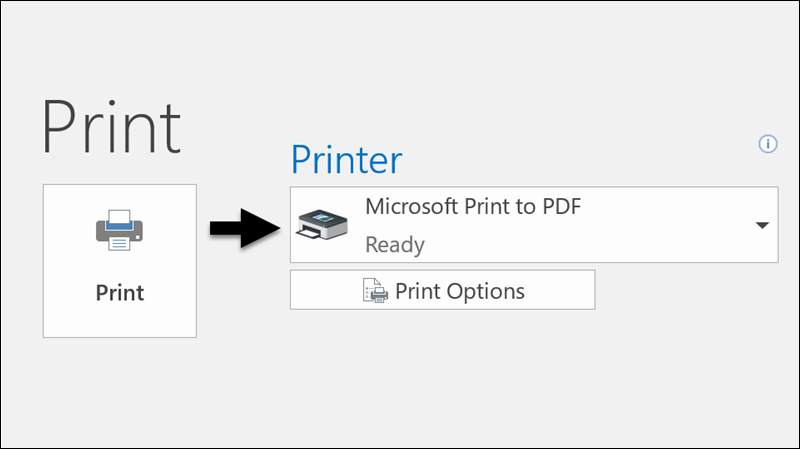Save an Outlook message as a .eml file, a PDF file, or as a draft
Outlook gives you several options for saving an email message. A message that you receive, for example, can be saved as a file on your computer or in another folder in Outlook. A message you're composing can be saved as a draft and finished later.
Select a tab option below for the version of Outlook you're using. What version of Outlook do I have?
Note: If the steps under this New Outlook tab don't work, you may not be using new Outlook for Windows yet. Select Classic Outlook and follow those steps instead.
Save a message as a file on your computer or in the cloud
-
In Mail, from the message list, select the message you want to save so it opens in the reading pane, or double-click the message to open to open it in a new window.
-
From the message header, select More actions > Save as.
Tip: You can also right-click the message from the message list and from the menu, select Save as.
-
Select the folder (or cloud location) where you want to save your message. The name of the file defaults to the title of your message which you can rename if you choose to do so.
-
Click Save.
Save a message as a PDF file
New Outlook doesn't include PDF as one of the defaults Save as types. The Microsoft Print To PDF utility included in Windows 10 and Windows 11 allows you to print any email message directly to a PDF.
-
Open the message you want to save as a PDF.
-
In the message, select More actions > Print > Print.
-
In the Printer dropdown, select Microsoft Print to PDF.

-
Select Print.
-
In the Save Print Output As box, choose a folder to save your PDF to and enter a file name. Then choose Save.
Save a draft of a message that you want to finish later
Saving a draft is done automatically. A draft is always saved in the Draft folder.
A draft is saved every 30 seconds and there's no way to change that time interval, or to change the location for where you save a draft.
To manually save a draft
-
From the ribbon select Options, then select Save draft.
To return to a saved draft of a message
-
In the Folder pane, select Drafts and then select a message, or double-click it to open it in a new window.
-
If you want to delete the draft, select the message and click Delete , or right-click it and from the dropdown, select Delete.
Better together tip: Manage drafts from Outlook for iOS and Outlook for Android
If you use Outlook for iOS or Outlook for Android, your drafts will automatically synchronize to your mobile device. From there, you can finish messages you've started at your computer, easily add attachments from your photos or camera, or use Office Lens to capture notes from a whiteboard in a meeting.
Save a message as a Word document or a template
Saving a message as a Word document or a template isn't supported.
Save or move a message to another Outlook folder
If you want to save a message to another Outlook folder, the easiest way to do so is to move or copy the message to the destination folder. See Move or copy an item to another folder.
Save a message as a file on your computer or in the cloud
-
Double-click to open the message you want to save, and on the File menu, click Save As.

-
In the Save as dialog box, in the Folder pane, choose a folder, and then the location in that selected folder where you want to save the file.

-
In the File name box, type a name for the file.
-
In the Save as type list, accept the default type, or choose another file type in the list.
Save a message as a PDF file
Outlook doesn't include PDF as one of the default Save as types. The Microsoft Print To PDF utility included in Windows 10 or Windows 11 allows you to print any email message directly to a PDF.
-
Open the message you want to save, and on the File tab, click Print.

-
From the Printer drop-down, choose Microsoft Print to PDF.

-
Choose Print.
-
In the Save Print Output As box, choose a folder for your PDF and enter a file name. Then choose Save.
Save a message as a Word document
Outlook can’t save a message directly as a Word document file. You can, however, save the message as an HTML file, then open that file in Word. Saving your email message as an HTML file preserves all formatting, images, and links, as well as includes the header information, which includes the From, To, Cc, and Subject information.
-
Open the message you want to save, and on the File tab, click Save As.
-
In the Save as dialog box, in the Folder pane, choose a folder, and then the location in that selected folder where you want to save the file.
-
In the File name box, type a name for the file.
-
In the Save as type list, choose HTML and then choose Save.
-
Open Word and choose File > Open.
-
Select the HTML file you saved in step 4.
-
Choose File > Save As, and then choose Word Document (*.docx) from the file type drop-down before choosing Save.
Save a message as a template
Use email templates to send messages that include information that doesn't change from message to message. You can create and save a message as a template, and then use that template. Add any new information before you send the template as a message.
Tip: For more information about how to use templates, see Send an email message based upon a template.
-
On the Home tab, click New Email.
-
In the message body, enter the content that you want.
-
In the message window, click the File tab, and then click Save As.
-
In the Save As box, in the Save as type list, click Outlook Template.
-
In the File name box, enter a name for your template, and then click Save.
Change the default file format for saving messages
Outlook supports Unicode, a character encoding standard that enables most of the written languages in the world to be represented by using a single character set. If you work in a multinational organization or share messages and items with people who use Outlook on computers that run in other languages, you can take advantage of Unicode support in Outlook.
To save your messages in a Unicode encoding by default
-
On the File tab. choose Options > Mail.
-
Under Save messages, select the Use Unicode Format check box.
Save a draft of a message that you want to finish later
Any message that you create, but don’t send, is saved automatically to the Drafts folder. You can return to Outlook later and find the unsent message.
To manually save a draft of a message
-
Do one of the following:
-
On the Quick Access Toolbar, click Save.
-
On the File tab, click Save.
-
To return to a saved draft of a message
-
In Mail, in the Folder pane, click Drafts, and then double-click the message.
Better together tip: Manage drafts from Outlook for iOS and Outlook for Android
If you use Outlook for iOS or Outlook for Android, your drafts will automatically synchronize to your mobile device. From there, you can finish messages you've started at your computer, easily add attachments from your photos or camera, or use Office Lens to capture notes from a whiteboard in a meeting.
Change the time interval or location for saving drafts
By default, unfinished messages are saved to your Drafts folder every three minutes. You can change this time interval or location.
-
On the File tab, click Options > Mail.
-
Under Save messages, do one or more of the following:
-
To change where drafts are saved, in the Save to this folder list, choose Drafts, Inbox, Sent Mail, or Outbox.
-
To change how frequently draft are saved, in the Automatically save items that have not been sent after this many minutes box, type a number from 1 to 99.
-
Save or move a message to another Outlook folder
If you want to save a message to another Outlook folder, the easiest way to do so is to move or copy the message to the destination folder. See Move or copy an item to another folder.
Save a message as a file on your computer or in the cloud
-
From the message list, select the message you want to save so it opens in the reading pane, or double-click the message to open to open it in a new window.
-
From the message header, select More actions > Save as.
Tip: You can also right-click the message from the message list and from the menu, select Save as.
The message will be saved automatically, usually in the Downloads folder. The name of the file defaults to the title of your message and will be saved as an .eml file.
Save a message as a PDF file
New Outlook doesn't include PDF as one of the defaults Save as types. The Microsoft Print To PDF utility included in Windows 10 or Windows 11 allows you to print any email message directly to a PDF.
-
Open the message you want to save as a PDF.
-
In the message, select More actions > Print > Print.
-
In the Printer dropdown, select Microsoft Print to PDF.

-
Select Print.
-
In the Save Print Output As box, choose a folder for your PDF and enter a file name. Then choose Save.
Save a draft of a message that you want to finish later
Saving a draft is done automatically. A draft is always saved in the Draft folder.
A draft is saved every 30 seconds and there's no way to change that time interval, or to change the location for where you save a draft.
To manually save a draft
-
From the ribbon select Options, then select Save draft.
To return to a saved draft of a message
-
In the Folder pane, select Drafts and then select a message, or double-click it to open it in a new window.
-
If you want to delete the draft, select the message and click Delete , or right-click it and from the dropdown, select Delete.
Better together tip: Manage drafts from Outlook for iOS and Outlook for Android
If you use Outlook for iOS or Outlook for Android, your drafts will automatically synchronize to your mobile device. From there, you can finish messages you've started at your computer, easily add attachments from your photos or camera, or use Office Lens to capture notes from a whiteboard in a meeting.
Save a message as a Word document or a template
Saving a message as a Word document or a template isn't supported.
Save or move a message to another Outlook folder
If you want to save a message to another Outlook folder, the easiest way to do so is to move or copy the message to the destination folder. See Move or copy an item to another folder.










